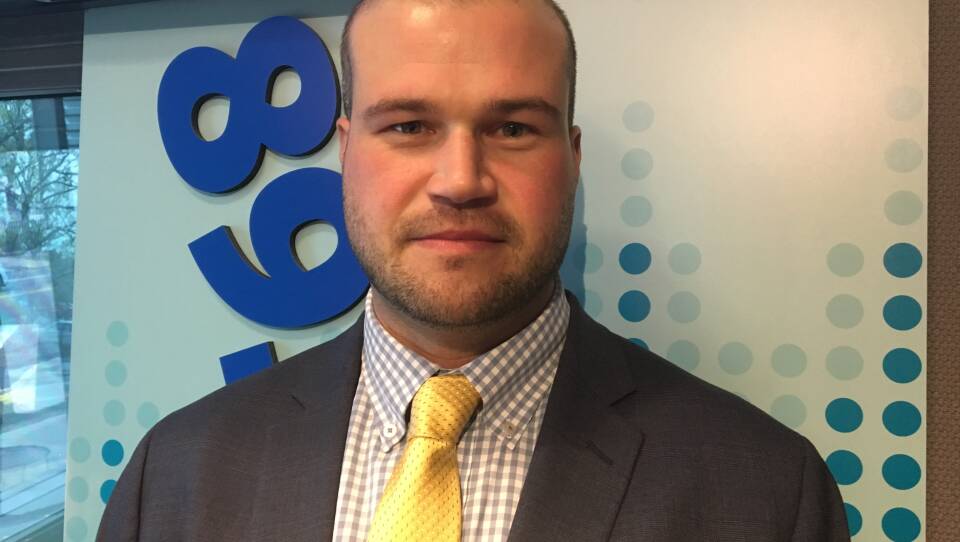People in the building trades — including laborers, iron workers, carpenters, roofers and sheet metal workers — often end up with injuries due to the physical labor involved in their work. To deal with the pain, many end up addicted, using opioids after work and sometimes on the job. Tom Gunning is director of labor relations for the Building Trades Employers Association. He has worked with addicts in his industry, and he is also a recovering addict himself. Gunning spoke with WGBH News' All Things Considered Host Barbara Howard about his experiences. The transcript below has been edited for clarity.
Barbara Howard: I understand that you've been heading up a conference all this week here in Boston. It's called the "Building Trades Recovery Week," and it's all about opioid addiction. The state's Department of Public Health came out with figures in August about this problem. What can you tell me?
Tom Gunning: Yeah, they came out with figures that for every 100,000 workers, 150 die from an opioid overdose, and construction workers are six times more likely to overdose than any other industry in the state.
Howard: They make up a quarter of all the opioid overdose deaths in Massachusetts, according to that report.
Gunning: 25 percent. That's a lot.
Howard: So you're like an umbrella group of the employers who bring in the skilled workers. Have you seen any interesting initiatives that they're taking to try to deal with this problem?
Gunning: We had two contractors speak during a conference this week, Karas & Karas Glass and Jim Morgan of Worcester Air. And Jim Morgan helped facilitate the sheet metal drug testing program within that union. And what he does is, if there's a guy struggling, he sends him down to a treatment place, and he'll take the kid back if there's a job available. With Karas & Karas, they have started a pretty good program within their own company where they will grab sober guys out of the Gavin House in South Boston, a rehab facility. They grab sober guys out of the house that are interested in the building trades, and if they would like to get in, they send them over to the Iron Workers Union, take them in as a probationary member, see how they do, and then Karas & Karas will employ them. And they make sure that this kid has the support within his company, and they make sure they attend certain meetings at the union hall — AA meetings. They make sure that the kid is set up to get a bank account, or how to do his taxes, or if he needs counseling, they give it to him. It's just a model for the rest of the industry.
Howard: It all comes down, though, to dollars and cents. Can he afford to do that for long?
Gunning: So with union insurance, we have some of the best benefits out there, and their health insurance is top notch. So health insurance picks up a lot of this coverage.
Howard: I understand some people have been known to overdose on the job. Narcan, the overdose reversal drug, is that something being considered?
Gunning: Yeah. We're encouraging Narcan on all job sites.
Howard: Are any people taking you up on that?
Gunning: Yeah, we have some forward-thinking companies who have sent all their safety personnel, superintendents, and foremen to our Narcan training this week, which will then put it on all of their job sites throughout New England. In a perfect world Narcan should be everywhere. You know, good people are dying, good people are struggling out there, but it's not going to stop the problem — it's just another tool to have in the toolbox and make Boston's job sites some of the safest job sites in the world. It's not just the union construction industry. We're creating a forum here to get the people help, reduce the stigma and save lives. We're helping our guys go away, get treatment, and providing jobs for them when they get back so we can remove that fear of losing a job.
Howard: How many of your union employers are on board for this, helping people with addiction?
Gunning: All of them —
Howard: 100 percent?
Gunning: 100 percent. They're very interested.
Howard: That's Tom Gunning with the Building Trades Employers Association. At 11:30 sharp Friday morning, his association called on construction workers across the city of Boston to stand down, to pause and observe two and a half minutes of silence — 150 seconds — to mark the 150 opioid related deaths per 100,000 among construction workers in Massachusetts each year.
Read More: Construction Work Can Be Dangerous. Now There’s Evidence Of Another Risk: Addiction




